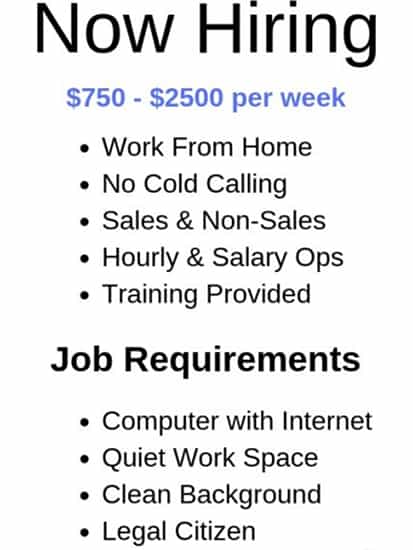Over the past five years, the remote work industry has grown by 44%. This means more and more people desire flexible work-from-home options. Unfortunately, the demand for more work-at-home jobs paves the way for more job scams to occur.
Some scammers use job listings to gain sensitive personal information or even to conduct crimes like fraud. It’s easier to become a victim of a work-from-home job scam since you’d likely be communicating with people online and over email instead of in person.
Sites like Craigslist can be great for finding flexible work opportunities, but you also want to be aware of dishonest work-from-home job descriptions. Here are some red flag terms you may encounter during your job search that may signal a scam.

‘No Experience Needed’
Be mindful of job listings that claim you don’t need any experience or credentials. If the company truly wanted to hire someone with no experience, they could likely just pull anyone in off the street to do the work.
Pay close attention to job descriptions and whether they require experience or if they provide training. If the job listing seems like just anyone could apply and be considered, this should raise a red flag.
Most legitimate work-from-home jobs require a specific skill set or level of experience, so this should be clear when you’re reading the description.
‘Earn Up to $_________’
I see these job ads on Craigslist all the time. Here is one I ran across today.

This job listing screams scam because it’s disclosing a large compensation amount in the hopes of reeling in people. When I clicked on the link, it redirected me to a slideshow presentation and survey.
I didn’t watch the video, but odds are, it would claim a secret job or business would let people earn $16,500 per month. The presentation would also probably try to sell people a program or course to help them get started and learn how to be successful with this job or business.
The problem that I have with these work-from-home job ads is that they are misleading. First, if you’re selling a program to teach someone a skill or how to start a particular business, it’s best to be transparent and market your offering as an educational webinar (NOT a job lead). Second, the headline does not even list what the job is. If you’re claiming that someone will make more than six figures per year, it’s essential to know what the work is upfront, unless it’s actually a scam.
‘No Cold Calling’
I had a telemarketing job back in college, and it was the worst. I can’t even imagine what it would be like to cold call people from my own home. This is why I find it interesting that some work-from-home job ads include the words ‘No Cold Calling’ in the headline.

Why would someone be considering cold calling in the first place? What is the actual job? Below is a screenshot of a work-from-home job description that comes off as a scam.
When you click on the link to apply for this specific job ad, it takes you straight to an application link. No other information about the job is provided, so people wouldn’t even know what they’re applying for.
I know many people who wouldn’t mind earning anywhere from $750 to $2,500 per week from home. I also know a lot of people who meet the rather vague and basic requirements for this job. Still, this opportunity comes off as fishy because no one knows what the work is. The words ‘no cold calling’ and ‘sales and non-sales’ make me think this is a phone-based work-from-home.
My bet is that people would be expected to do telemarketing sales calls and call “warm” leads, which can still feel like cold calling. There’s also no telling whether people would get paid hourly or a commission.
‘Make Money Posting Ads Online’
This is another dishonest work-from-home job description, although it does reveal more about what the job is. Making money by simply posting ads online is not a realistic work-from-home job.
Most of these jobs are scams and require that you pay money to get started, and then post ads to social media and other forums. The ads you post are often advertisements about how others can make money posting ads online (often, it’s the same “job ad” that initially attracted you).
You only get paid when someone else signs up and pays the start-up fee, which makes this a pyramid scam.
Other Dishonest Work-From-Home Job Descriptions and Scams
There are many other dishonest work-from-home job descriptions that you may need to look out for. Here are some of the more common remote work scams out there.
Virtual Assistant – Becoming a virtual assistant can be a great way to earn money from home – only if the work is legitimate. Some job ads use the title ‘virtual assistant’ or ‘personal assistant,’ but they don’t involve honest work. If someone ever asks you to wire money, cash checks, or send packages in the mail, this is likely a scam.
Assembly Jobs – If you enjoy working with your hands, be mindful of work-from-home assembly job scams. The job ad may say that you will have to use kits to assembly crafts and jewelry from home. The trick is that you may be asked to spend hundreds of dollars on crafting materials that could help you get the work done. Plus, you may not get paid if the item is not assembled correctly. Hint: The item will never be assembled correctly because it’s a scam, and you won’t get paid.
Forwarding Emails – I spend a ton of time answering and forwarding emails. If only there was a legitimate way to get paid well for it. Unfortunately, there isn’t. Again, scammers may ask you to pay upfront for materials or training, and if you do get paid to forward emails, it will be very little and not worth the time.
Medical Billing – Medical billing is a legitimate job that is easy to do from home. However, you need proper training for it, and some employers require that you become certified in medical billing and coding. Healthcare is a highly regulated business, and some scammers may ask you to purchase software to get started. See the trend here? If you’re going to work for a company remotely, they will almost always provide software and systems for you to use.

Additional Ways to Spot a Scam
Sometimes, you may not know that the work-from-home opportunity you’re going for is a scam until the last minute. Here are some additional ways to spot a dishonest work-from-home job opportunity.
- The email address is not a company email – If you’re applying to work for a specific company, check to make sure the person who’s emailing you matches that company. If they’re using a general email address from Gmail or Yahoo, you may want to look into it and verify that they are who they say they are.
- You’re asked for money upfront – It’s perfectly fine to buy courses and pay for training on your own, but if you are hired for a work-from-home job you shouldn’t be spending your own money on this.
- You’re hired too easily and don’t know what the job is – In the past, I’ve been “hired” for jobs very quickly without even applying or interviewing. All of those opportunities turned out to be bad experiences.
- You’re asked to provide sensitive information early on – Be skeptical about sharing confidential information too soon like your social security number, banking information, or any other details that could pose problems for you if they got into the wrong hands. Most legitimate work-from-home job opportunities won’t even ask you for this info upfront.
Conclusion
No one wants to become a victim of a work-from-home job scam. Keep in mind that most job scams will appear too good to be true, or they will only provide vague details, preventing you from being able to make a sound decision.
One thing you can do is also be mindful of where you search for work-from-home jobs. Try to limit time spent searching for jobs on sites like Craigslist that aren’t as well regulated, meaning practically anyone can post an ad on the platform.
FlexJobs is a great site to consider when looking for legitimate work-from-home opportunities as well as the researched reviews and information provided here on The Work at Home Woman. Taking time to carefully dissect work-from-home job opportunities to narrow down the ones that are promising and pay well is definitely worth the effort.






